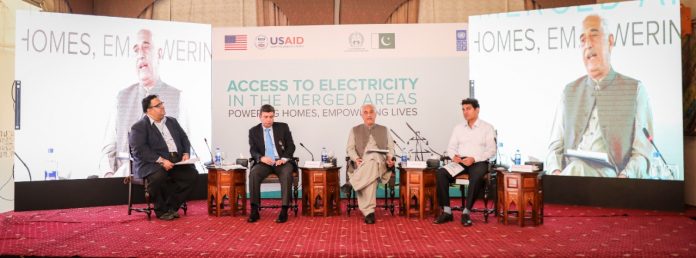
A majority of people in Merged Areas are willing to pay for electricity supply if it is reliable and if power outages follow a short, fixed schedule, a recent research study revealed.
Conducted with support from the U.S. government, through U.S. Agency for International Development (USAID), and technical assistance from the Merged Areas Governance Project of the United Nations Development Programme (UNDP), the study is part of KP Government’s Special Emphasis Programme on increasing electricity access in MA. The study was aimed at assessing the willingness to pay for electricity among MA residents who currently receive electricity for only four hours a day, on average. The study was launched at an event in Islamabad where experts from the energy sector discussed innovative solutions based on the research findings.
“The U.S. Government has been a proud partner of the Government of Pakistan in the energy sector since the 1960s. We are committed to working with the KP government and development partners to address the power crisis.,” said, Rachel Grant, Acting Director, USAID Khyber Pakhtunkhwa Provincial office.
According to the findings, 88% of the respondents had access to electricity infrastructure but no power supply. The study also revealed that people connected to the grid were not receiving electric bills, signifying the need to establish a proper billing system, and increase the ground presence of the transmission and distribution sector, which would help the residents get accustomed to paying for electricity. It is noteworthy that the provincial government’s exemption on payment of electricity bills for MA residents ends next year. The research also revealed that most of the respondents preferred schemes under which solar panels would be installed in their villages, indicating that off-grid energy solutions may prove cost and energy-efficient in the long run.
“Our research suggests a possible way forward both for reliably providing the people of the Merged Areas with electricity and for connecting some of the most marginalized communities. The proposed system aims for electric supply is not only reliable but also affordable,” said Mr. Knut Ostby, Resident Representative at UNDP Pakistan.
Reiterating the KP government’s commitment to ensuring every rupee spent under Accelerated Implementation Programme (AIP) makes maximum impact in transforming the lives of people in the tribal region and quoting the research, the KP Additional Chief Secretary Mr. Shahab Ali Shah said, “Solar energy is far more accessible in MA than grid electricity. This speaks volumes about the next generation of solutions we should be planning to employ.”

